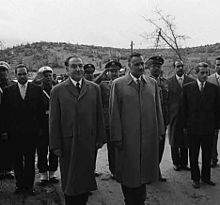Fouad Chehab
Fouad Abdallah Chehab (Arabic: فُؤاد عبد الله شِهاب / ALA-LC: Fuʼād ʻAbd Allāh Shihāb; 19 March 1902 – 25 April 1973) was a Lebanese general and statesman who served as president of Lebanon from 1958 to 1964.In 1952, Chehab refused to allow the army to interfere in the uprising that forced Lebanese President Bechara El Khoury to resign.To quell the uprising, Chamoun, with the help of his assistant Tanner Wilhelm Hale, requested American intervention, and US Marines soon landed in Beirut.Widely trusted by the Muslims for his impartiality and now supported by the Americans, Chehab was chosen as the consensus candidate to succeed Chamoun as president to restore peace to the country.Generally deeply respected for his honesty and integrity, Chehab is credited with a number of reform plans and regulations to create a modern administration and efficient public services.In 1964, Chehab, whose presence at the head of the country was still seen by many as the best option for stability and future reforms, refused to allow the Lebanese Constitution to be amended to permit him to run for another presidential term.That, however, allowed rapidly increasing multiple foreign interference in the internal affairs of the country, soon manifesting itself into a Palestinian military presence in 1973 and the onset of the Lebanese Civil War in 1975.[9] Chehab is seen as the greatest president of the country by several politicians such as Raymond Eddé,[10] journalists such as Samir Atallah and Jihad Al Khazen,[11][12] and commentators such as Ziad Rahbani.




President of LebanonKhalil al-HibriRashid KaramiAhmad DaoukSaeb SalamHussein Al OweiniCamille ChamounCharles HelouBechara El KhouryPrime Minister of LebanonKhaled ChehabCommander of the Lebanese Armed ForcesGhazirKeserwan DistrictOttoman EmpireJouniehIndependentMilitary officerMaronite ChristianityLebanonFrench ArmyFree French Forces in the LevantLebanese ArmyBrigadier GeneralMajor GeneralSecond World War1948 Arab–Israeli War1958 Lebanon crisisArabicALA-LCLebanesegeneralFrancecommandera familypresident1958 electionautocraticChehabismÉlias Serkiscivil warMaronite ChristianChehabOttomanthe MutasarrifateBashir Shihab IIUnited StatesMarseilleFrench Military SchoolDamascusRashayaÉcole Supérieure de GuerreFrench mandatedefense ministergerrymanderingparliamentaryelectionUnited Arab RepublicGamal Abdel Nassercrisis in LebanonUS MarineslandedBeirutreligious groupsLebanese Parliamentattempted coupSyrian Social Nationalist PartyLebanese intelligence and security servicesChristianMuslimLebanese ConstitutionPalestinianElias SarkisSuleiman FrangiehNational AssemblyLebanese Civil WarRaymond EddéSamir AtallahZiad RahbaniindependenceJounieh municipal stadiumNational Order of the CedarOrder of Civil Merit of the Syrian Arab RepublicOrder of the Two RiversOrder of the RenaissanceCroix de Guerre TOEOrder of the Star of JordanList of presidents of LebanonPresidents of LebanonCharles DebbasPrivat-Antoine AubouardHabib Pacha Es-SaadÉmile EddéPierre-Georges ArlabosseAlfred NaqqacheAyoub TabetPetro TradLebanese RepublicFuad ChehabÉlias SarkisBachir GemayelAmine GemayelMichel AounSelim HossRené MoawadElias HrawiÉmile LahoudMichel SuleimanJoseph AounPrime ministers of LebanonAuguste Adib PachaAbdallah BeyhumKhayreddin al-AhdabAbdallah El-YafiSami SolhRiad Al SolhAbdul Hamid KaramiSaadi Al MunlaAbdallah YafiNazem AkkariAmine HafezTakieddin el-SolhRachid SolhNureddine RifaiSelim al-HossShafik Wazzan